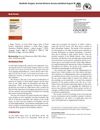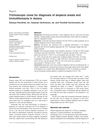
A new system for classifying curly hair types using precise measurements can improve hair care products and cultural inclusion.
 26 citations,
January 2013 in “BioMed Research International”
26 citations,
January 2013 in “BioMed Research International” Hormonal changes after childbirth and menopause can lead to women's hair loss and facial hair growth, with a need for better treatments.
 25 citations,
September 2014 in “Dermatologic Surgery”
25 citations,
September 2014 in “Dermatologic Surgery” Hair transplants can effectively treat hair loss from CCCA in African American women if there's no inflammation.
 11 citations,
December 2016 in “Frontiers in Psychology”
11 citations,
December 2016 in “Frontiers in Psychology” Hair style affects perceptions of age, health, and attractiveness more than hair color does.
 13 citations,
March 2019 in “Journal of cosmetic dermatology”
13 citations,
March 2019 in “Journal of cosmetic dermatology” Heat damages hair, with Asian hair losing more protein than Caucasian hair.
 5 citations,
September 2016 in “Journal of Cosmetic Dermatology”
5 citations,
September 2016 in “Journal of Cosmetic Dermatology” Nourkrin® with Marilex® may increase hair count by 35.7% in postpartum hair loss.
 75 citations,
March 2009 in “Journal of The American Academy of Dermatology”
75 citations,
March 2009 in “Journal of The American Academy of Dermatology” CCCA is a hair loss type affecting African women, possibly caused by grooming and chemicals, with various treatments and needing more research.
 105 citations,
April 2004 in “Dermatologic Therapy”
105 citations,
April 2004 in “Dermatologic Therapy” The document concludes that proper diagnosis and a combination of medical, hair-care, and surgical treatments are important for managing alopecia in black women.
65 citations,
September 2014 in “BMC genomics” Different hair types in mammals are linked to variations in specific protein genes, with changes influenced by their living environments.
 August 2024 in “Cosmetics”
August 2024 in “Cosmetics” K18® and Olaplex® both effectively repair bleached hair, improving its strength, smoothness, and overall health.
 5 citations,
February 2010 in “Facial Plastic Surgery Clinics of North America”
5 citations,
February 2010 in “Facial Plastic Surgery Clinics of North America” The document concludes that understanding hair loss and considering medical treatments like minoxidil and finasteride before surgery is important, especially for young patients with rapid hair loss, and that hairline design varies among different ethnicities.
10 citations,
December 2020 in “Dermatitis” Ethnic hair products contain different allergens than nonethnic ones, with fragrance being the most common in ethnic products.
 42 citations,
April 2008 in “Acta materialia”
42 citations,
April 2008 in “Acta materialia” Different ethnicities and treatments affect human hair strength and structure.
 25 citations,
May 2019 in “Heliyon”
25 citations,
May 2019 in “Heliyon” Hair treatments cause significant structural changes, especially with excessive heat, regardless of ethnicity.
 August 2015 in “Aesthetic Surgery Journal”
August 2015 in “Aesthetic Surgery Journal” The issue provides detailed guidance on ethnic considerations in facial plastic surgery, with high-quality visuals and useful information for practitioners, but could be more concise in some parts.
 73 citations,
June 2003 in “Journal of the American Academy of Dermatology”
73 citations,
June 2003 in “Journal of the American Academy of Dermatology” Dermatologists need to understand African American hair-care practices to better treat their hair and scalp disorders.
55 citations,
March 2007 in “Journal of cosmetic dermatology” Afro-ethnic hair can be straightened using chemical and heat methods.
 10 citations,
May 2015 in “International Journal of Women's Dermatology”
10 citations,
May 2015 in “International Journal of Women's Dermatology” New treatments for skin and hair disorders in women of color address unique biological differences and include specific acne medications, sunscreens, skin lighteners, and hair care adjustments.
27 citations,
October 2003 in “Dermatologic Clinics” Certain hair care practices in African American girls can lead to scalp and hair issues.
 32 citations,
August 2015 in “Anais Brasileiros de Dermatologia”
32 citations,
August 2015 in “Anais Brasileiros de Dermatologia” Black women's unique hair characteristics and styling practices can lead to specific scalp conditions, which require early diagnosis and appropriate treatment.
 89 citations,
August 2008 in “Human genetics”
89 citations,
August 2008 in “Human genetics” The EDAR gene greatly affects hair thickness in Asian populations.

Understanding hair surface properties is key for effective hair care products.
 3 citations,
September 2020 in “Journal of cosmetic dermatology”
3 citations,
September 2020 in “Journal of cosmetic dermatology” Coconut oil makes hair stronger and more flexible than mineral oil.
8 citations,
February 2022 in “International Journal of Dermatology” Lipids are crucial for healthy hair, protecting it from damage and breakage.
 September 2023 in “Journal of the American Academy of Dermatology”
September 2023 in “Journal of the American Academy of Dermatology” Curly/coily hair products are more expensive than straight hair products.
10 citations,
June 2019 in “Cosmetics” Mixed-race individuals have hair with varied shapes and more root damage.
2 citations,
July 2018 in “Skin research and technology” Greasy hair spreads sebum twice as much as nongreasy hair over time.
 October 2024 in “Cosmetics”
October 2024 in “Cosmetics” Afro-textured hair needs personalized care due to its unique genetic traits.
 37 citations,
January 2017 in “International Journal of Dermatology”
37 citations,
January 2017 in “International Journal of Dermatology” Trichoscopy helps tell apart alopecia areata and trichotillomania in Asians by looking at specific hair and scalp features.
 1 citations,
January 2017 in “Evolutionary studies”
1 citations,
January 2017 in “Evolutionary studies” Different human traits like skin color and hair type vary between populations due to genetic adaptations to the environment.






















